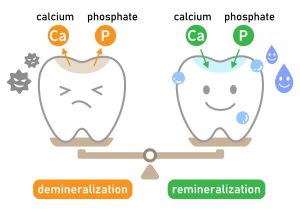
Restore your teeth minerals with Hydroxyapatite
If you ever stopped by our office, you have surely heard the doctors mentioning hydroxyapatite. But, what exactly is this mineral and why do the doctors keep talking about it?
Hydroxyapatite is a naturally occurring mineral that makes up around 70% of our bones and teeth and over 95% of tooth enamel. It is primarily composed of calcium phosphate, which gives it its strong and durable properties. In addition to being a major component of our skeletal system, hydroxyapatite also plays a vital role in enamel maturation when a new tooth erupts into the mouth, as well as in remineralizing weakened enamel.

Cavities happen when the hydroxyapatite that is part of enamel dissolves due to acid produced by bacteria in our mouths. The process of minerals dissolving out of our teeth is known as demineralization. However, when the pH level in the mouth becomes more alkaline, hydroxyapatite can begin to remineralize and repair the weakened enamel.
The enamel of newly erupted teeth continues to strengthen as calcium phosphate minerals deposit onto the surface. Sometimes molar teeth erupt with deep grooves, called pits and fissures, and the pits and fissures have a higher risk of developing decay. Applying hydroxyapatite to the grooves of newly erupted teeth can be a way to strengthen and mineralize the tooth structure.
Plaque is a sticky film of bacteria that forms on our teeth throughout the day. When plaque is not removed, it can produce acid that attacks the enamel and leads to the loss of minerals and enamel weakness, which in turn progresses to tooth decay. This is why removing plaque by brushing every morning and before bedtime, and flossing before bedtime is essential.
In order to remineralize tooth structure that has been affected by a loss of minerals, toothpaste with hydroxyapatite can be used; it strengthens and repairs enamel, as well as to prevents cavities from forming and reverses mild damage. In addition to remineralizing weakened enamel, hydroxyapatite can help to strengthen tooth roots that may have been exposed due to gum recession.
While hydroxyapatite by itself will not help an active cavity that has already reached the dentin (the middle layer of the tooth), it can prevent cavities from forming in the first place.
So next time you hear our doctors mentioning hydroxyapatite, know that they are talking about a natural and essential mineral for maintaining healthy teeth. By incorporating toothpaste with hydroxyapatite into your oral hygiene routine, you can help to strengthen and protect your teeth from cavities and other dental issues.
Additional research is being conducted on hydroxyapatite, with promising results showing its potential use in bone grafting and as a coating for dental implants. This mineral continues to be an important topic in the field of dentistry, with ongoing studies exploring its various applications and benefits for oral health. As technology advances, it is possible that hydroxyapatite will play an even larger role in preserving and enhancing our dental health. So, stay tuned for more updates and advancements on this crucial mineral!
